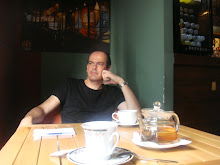When I read the first few lines of the article today, I was wondering: "But why would a professor in China at this point in time choose to disrupt his normal class schedule and switch to an improvised (?) speech on his belief in the inherent goodness of the Israëlian state ?" Let's admit that, no matter what your opinions on the Israëli - Palestinian conflict may be, it's an uphill battle he was in for, with the images coming out of Gaza, and some of the comments on the article (that was also posted on Mr. Zhou's blog) are ample evidence of it.
But then reading further down the article, there's these interesting two paragraphs:
I was once looking through photos posted onto [Chinese SNS website] Xiaonei.net, and one photo made me think deeply. The caption for this photo was “Hero,” and the photo showed an unarmed Palestinian youth standing in front of a long line of Israeli tanks. He forced the tanks to stop.
Students, this Palestinian youth is indeed a “Hero,” fighting fully equipped tanks with his body of blood and flesh. But students, have you thought about this? In a situation of hostility how many countries’ tanks would stop? The Japanese tanks that invaded China didn’t stop, the Russian tanks that invaded Georgia didn’t stop, but the tanks of Israel did. I personally believe that these soldiers, as well as others in their ethnic group, are the real and undeniable heroes.
The professor found ... the Gaza Tank Man ! And this got me thinking ...
Maybe I read more in this text than there is to find, but the image he relates to IS an exact copy of a scene which happened in June 1989 on Tiananmen Square, which made the rounds of the global media and still stands as one of the most powerful images of the last few decades, maybe at par with this picture which inspired me to this blog post. The scene has been televised again and again all over the world ... or was it ? Could it be that China "forgot" to show it to it's citizens ? I am wondering why, in the year that will witness the 20th anniversary of the student demonstrations on Tiananmen, a professor at one of the top universities of the country, in the capital of China where the Chinese future elite is gathered, would want to bring up exactly this image, be it transposed to a different setting ?
My take on the speech is that what follows doesn't really matter anymore: it was this part that had to drive the message home. My take is that we are seeing the beginning of a brainwashing operation to "welcome" the infamous anniversary. I imagine that most of China's youths that are currently in university have not yet have access to the "Tank Man" footage. Most of them were toddlers or maybe not even born yet at the time the events took place. Yet I am guessing that the Chinese government is realising that the risk that around the June timeframe coverage of the events of 20 years ago in the rest of the world will be so extensive, for instance via the internet, that there will be no way to completely avoid that some of them will be exposed to it. And that that is why the events need to be given a twist, that that is why a colonne of tanks that stops for one man standing in their way has to be labelelled benevolent and the soldiers "undeniable heroes". Mind also the wording of the chinese text: it's not just the soldiers, it's also the state (这样的国度) that produces such soldiers, that is lauded. The logic also cleverly anticipates on the most probable thing the Chinese students will get to hear from the outside world, even seemingly corroborating it at first, namely that "Tank man" is the hero, while immediately afterward toppling that "foreign" logic and bringing it back in the correct framework of the State and the soldiers being the real heroes for showing so much constraint. It made me think of the famous Mark Anthony speech in Shakespeare's "Julius Caesar": "Friends, Romans, Countrymen, lend me your ears: I have come to bury Caesar, not to praise him ..." with the shattering repitition of that "... and Brutus is an honourable man" which in the end means as good as his death verdict. Though brought much more eloquent by Shakespeare, the twisted and cunning rhetoric feels the same.
There's also a small part which is not found in the translation on "Danwei", but which I found in the original chinese text here and which seems to be be some complementary comment. It's not clear to me whether this should also be attributed to Zhou, or whether it's to be considered as added by someone else.
曦古评点一下:以色列坦克在巴勒斯坦“英雄”的面前停下来的举动,绝不是以色列政府为了宣传需要而为,也绝不是命令坦克停下来以便让外国记者拍摄或事后通过自己的喉舌表白自己是如何如何“克制”又是如何如何“仁慈”。
(Not sure on how to translate the first two characters, unless it's a name, Xigu - any addition / correction is very welcome):
"By way of commentary: the fact that Israëlian tanks halt in front of a Palestinian "hero", is in no way a propaganda move by the Israëlian government, as it didn't order the tanks to stop just for giving the foreign reporters some good footage nor to present itself afterwards with an opportunity to boast on how "constrained" and "benevolent" it had acted"
Whoever thought this was necessary to be added, must have been under the impression that repetition never hurts, and in my opinion clearly had the intention to downplay the role of the State in the events.
Frankly speaking, I was flabbergasted reading this ... but then again, I guess I shouldn't have been. I'm only curious whether it will work.
Commencing countdown: 5 months to go ...

